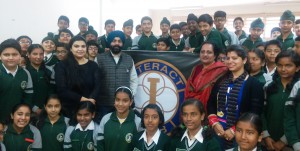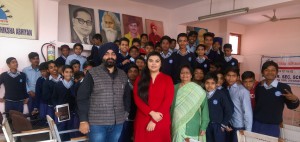“Happy Minds – Happy Lives” A Resilient Youth for a Better Tomorrow
Children are fearless and have a strong belief system, making them invincible. They climb trees without wondering how hurt they will be when they tumble, instead they simply climb up. Living in the moment in its true essence is their motto. But this gets lost as they mature and reservations which creep in making the same child not so valiant anymore.
Towards that end, The Mind Research Foundation had the opportunity of conducting multiple sessions with adolescent groups, in order to maintain as well as reinvigorate that essence of being valiant. The topic taken up was “Happy Minds – Happy Lives. A Resilient Youth for a Better Tomorrow.” The main theme was to address the concerns encountered by the adolescent children in their day to day lives and providing them small life hacks in order to overcome the same.
The first two sessions were conducted on 14th February, 2017 at Government Senior Secondary School, Manimajra Town, Chandigarh. It was a 30 minute interactive talk between the students of 8th and 9th class. The third session was conducted on 15th February, 2017 at Kundan International School, Chandigarh. The group consisted of 125 children (girls and boys) of class 8th and 9th.
The main areas covered were:
- Enhancing Social and Emotional Competence (Coping with extreme emotions)
- Self-Esteem & Self – Image (Self-Confidence, Body Image)
- Managing Behaviours & Outcomes (Anger, Aggression, parental pressure)
- Dealing with Peer Pressure (Upsurge of Social Media)
- Dealing with Environmental Stressors
The aim was to make children appreciate the meaning of “resilience” that is, bouncing back from negative to positive. The children were made to comprehend, the negative effects of social media which hinders one’s self-image and eventually self-esteem. They were made to recognize peer pressure and parental pressure and how it affects the person going through it and hence making them empathetic towards their fellow beings. They were made to appreciate the beauty of Mindfulness and Optimism not only to handle extreme emotions but also how to be resilient and competent. Some fundamental exercises, varying from appreciating oneself in the mirror to simple breathing exercises and recognising the emotions, were discussed and conducted.
On day one, the first session was with girls and the topic that the group seemed sensitive to was self-image. They were given ways to understand the beauty of every being and to appreciate oneself. The second session was conducted with a group of 80 boys and their interest was more towards handling aggression. They were given exercises and techniques on how to handle the same. The children were interactive and gave examples from their personal lives and questioned when required.
On day two, Children were responsive and interacted when needed. The experience was similar to the previous session but the variance came in form of teacher participation.
The overall feedback was beyond satisfactory which was evident through the big smiles, enlightened faces of the children and gratitude of the school authorities. Keeping in view the active participation of children and teachers alike, we feel that there is ample scope and need to spread awareness on such topics.
This is a small step taken by the Mind Research Foundation in the Chandigarh region where there is complete lack of awareness especially in the field of mental health. We look forward to organizing similar events in the future with a hope to create constructive dialogue and a brighter future.


